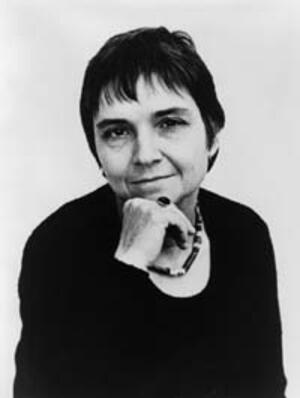Adrienne Rich
“The words are maps,” Adrienne Rich writes in “Diving Into the Wreck,” and, indeed, for my generation of feminists, Rich’s words have provided the compass by which we were able to orient ourselves and reorient our thinking through many stages of our work over many decades. I teach an essay or poem of hers in virtually every course, every semester. To read Rich and to teach her is to engage with the words of a beautiful sensitive writer and the thought of a tough, responsive and deeply committed intellectual who takes nothing for granted.
My first encounter with Rich was in 1977 when, during the last months of my pregnancy and the early months of nursing, I read and reread Of Woman Born. I read it for its feminist analysis of motherhood “as experience and institution,” my new state, but I found there the provocation for a project that would carry me through the following decade: “This cathexis between mother and daughter—essential, distorted, misused—is the great unwritten story,” Rich suggested.
She not only authorized me to write about the absent and suppressed story of mothers and daughters, but also inspired a way of writing, and a way of knowing, that would shape feminist discourse: “It seemed to me impossible from the first to write a book of this kind without being often autobiographical, without often saying ‘I.’” Through her words and her practice, personal experience, dailiness, and the vulnerabilities and passions of our embodied existence became valid objects of scholarly analysis and writing.
But the “I”—and the “we”—were also problems for Rich, and she exposed the dangers of “flirting with identity” and the lure of thinking “we know whom we meant when we said ‘we.’” Usefully, and importantly, at the height of the conflicts, competitions and appropriations characterizing the worst of identity politics, Rich gave us a her “Notes Toward a Politics of Location.” Again, it was the idea of location rather than identity that was important, but also the form of the “notes”—fragmentary, unfinished, provisional, forever to be revised.
Location is, in part, the materiality of the body: “The body I was born into was not only female and white, but Jewish.” Her writings about her Jewishness have provided another compass for me as my work began, more and more, to engage with that location as well. Her Jewishness, as she describes it, is not an identity but a question and a provocation. The daughter of a Jewish father and a gentile mother who raised her as an Episcopalian, Rich chose to be Jewish. She chose it as a way of responding to the “intrinsic” anti-Semitism around her (and, she learned to admit, within her) and the history of the Holocaust by which she was deeply touched. She chose it to bond with the world of her Jewish husband where she felt at home. But, mostly, she wore the Jewish star around her neck as a way to combat racism and discrimination, to connect with “the Jew as radical visionary and activist who understands oppression firsthand.” For her, being Jewish, along with being a woman and a lesbian, became a way to “mov[e] into accountability, enlarging the range of accountability.” Rich’s commitment to social justice that characterized her sustained engagement in the world emerged from the provocation and the aspiration that was her Jewishness.
It is hard to imagine how we will orient ourselves without her.



